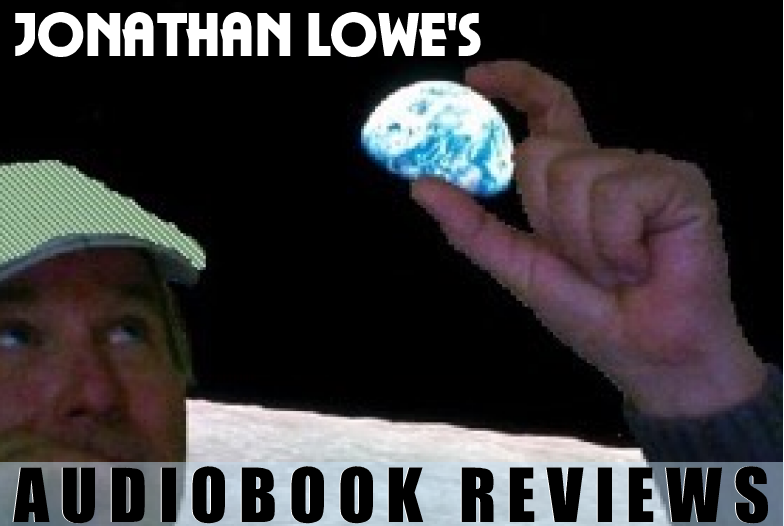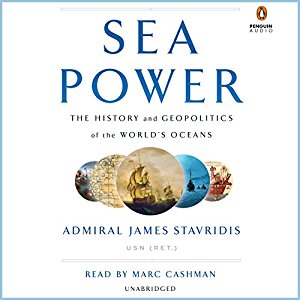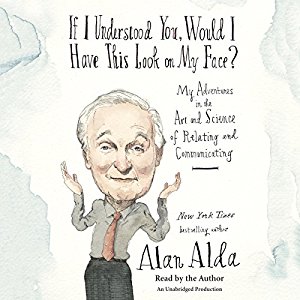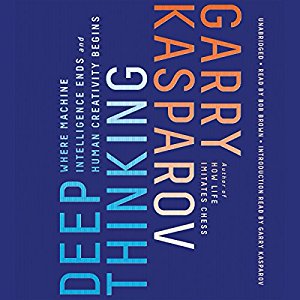The Earth is mostly covered by water, and while driving the weather the ocean is the staging area for geopolitical disputes over borders, climate change, fishing, pollution, and nuclear weapons. As former Supreme Allied Commander at NATO, Admiral James Stavridis looks at the history of the oceans from the point of view of the military, yet not neglecting the science. In SEA POWER, he shows how the geography of the oceans have shaped the destiny of nations, including our own (with a vast coastline that many nations do not possess.) From the battles of Salamis and Lepanto through to Trafalgar, the Battle of the Atlantic, and the submarine conflicts of the Cold War, he examines piracy and why the Arctic is the next hot spot for dominance, with melting ice giving access to new opportunities for exploitation of natural resources by the Russians. A fascinating overview of history that makes for educational listening. Narrator Marc Cashman is a veteran voice actor whose experience extends from radio, T V, and video games to coaching others on technique. Stavridis has commanded destroyers and a carrier strike group in combat. Currently he is dean of the Fletcher School of Law and Diplomacy at Tufts University.
Most communication is nonverbal. We want to look at the faces of those testifying in Congress and detect lies or deceit. They try to keep their faces blank in order not to telegraph this, but subtle clues or reactions are there in their voices and tone, too. Their pauses, gestures. IF I UNDERSTOOD YOU WOULD I HAVE THIS LOOK ON MY FACE? by Alan Alda talks about how the face is judged, not for just beauty or ugliness, but for believability. Why paying attention to people’s reactions or expressions when they talk is most important in understanding what they mean. Mostly we misunderstand what people say or mean, but by truly listening and observing we have a better chance of connecting (and resolving conflicts too.) Instead of waiting for people to stop speaking so we can make another point, Alda’s point is to LISTEN with all our senses with the objective to UNDERSTAND. Not to “win” an argument by demeaning or defeating anyone (or everyone) seen as an opponent. As James Garner once put it: “I don’t act. I react. Give me a reactor over an actor any time. It puts you there in the moment, and you’re less likely to flub the way you read your lines, too.” Alda was in the movies Bridge of Spies, The Aviator, Everyone Says I Love You, Manhattan Murder Mystery, and Crimes & Misdemeanors. On TV’s MASH, and Scientific American Frontiers. He has won 7 Emmys, and is a big fan of science. “At first I think they just wanted a famous face do the introduction, and then narrate off camera, but I wanted to be there and interview the scientists.” He’s read Scientific American magazine since a kid.
Garry Kasparov has written another book. Titled DEEP THINKING, it is mainly about the history (including his own history) with computers playing chess. Detailed accounts of his matches are augmented by ruminations on the nature of machine intelligence. The subtitle is “Where Machine Intelligence Ends and Human Creativity Begins.” Kasparov has a genius IQ, and due to his association with Deep Blue and other computer programs has an interest in the subject (which has become popular due to movies and books about robots taking over.) He discusses various scientific views, including those related by Ray Kurzweil (How to Create a Mind) and Nick Bostrom. He doesn’t believe that hard A.I. (the singularity of self-aware, conscious computers) will happen anytime soon, but agrees that the days of humans beating computers at chess is over. Having heard those other books on the subject (including writing a novella about hard A.I. “Transcendence 2”) I do agree, although no one knows for sure what may happen. Predicting the future will always be a flawed enterprise, since we don’t know what we don’t know. Einstein imagined a new way to look at time (that it wasn’t absolute), and until that moment everyone accepted long held beliefs about the nature of reality…which were proved to be wrong. Not only did he win a Nobel Prize for a different paper, but also became Time magazine’s only Person of the Century. The next such Person may be the one who creates a hard A.I., (if we survive the process.) There is no valid reason to believe that a hard A.I. would have the same (or any) values which we possess (including a desire to conquer or kill opponents) unless there is a way to instill them. So the “singularity” is unlikely to happen (except by accident) until we understand human consciousness (also a mystery.) The path to it is unknown, and only by traveling the correct path can it be achieved. Kasparov reads the introduction on the audiobook, which is then taken up by voice actor Bob Brown. A chess fan’s “must listen.”
Recommended new fiction on audio this month includes BANG by Barry Lyga, narrated by Charlie Thurston; WOMAN 17 by Edan Lepucki, read by Cassandra Campbell and Phoebe Strole; HOLD BACK THE STARS by Katie Khan, read by Gemma Whelan; and SHADOW MAN by Alan Drew, read by Will Damron




